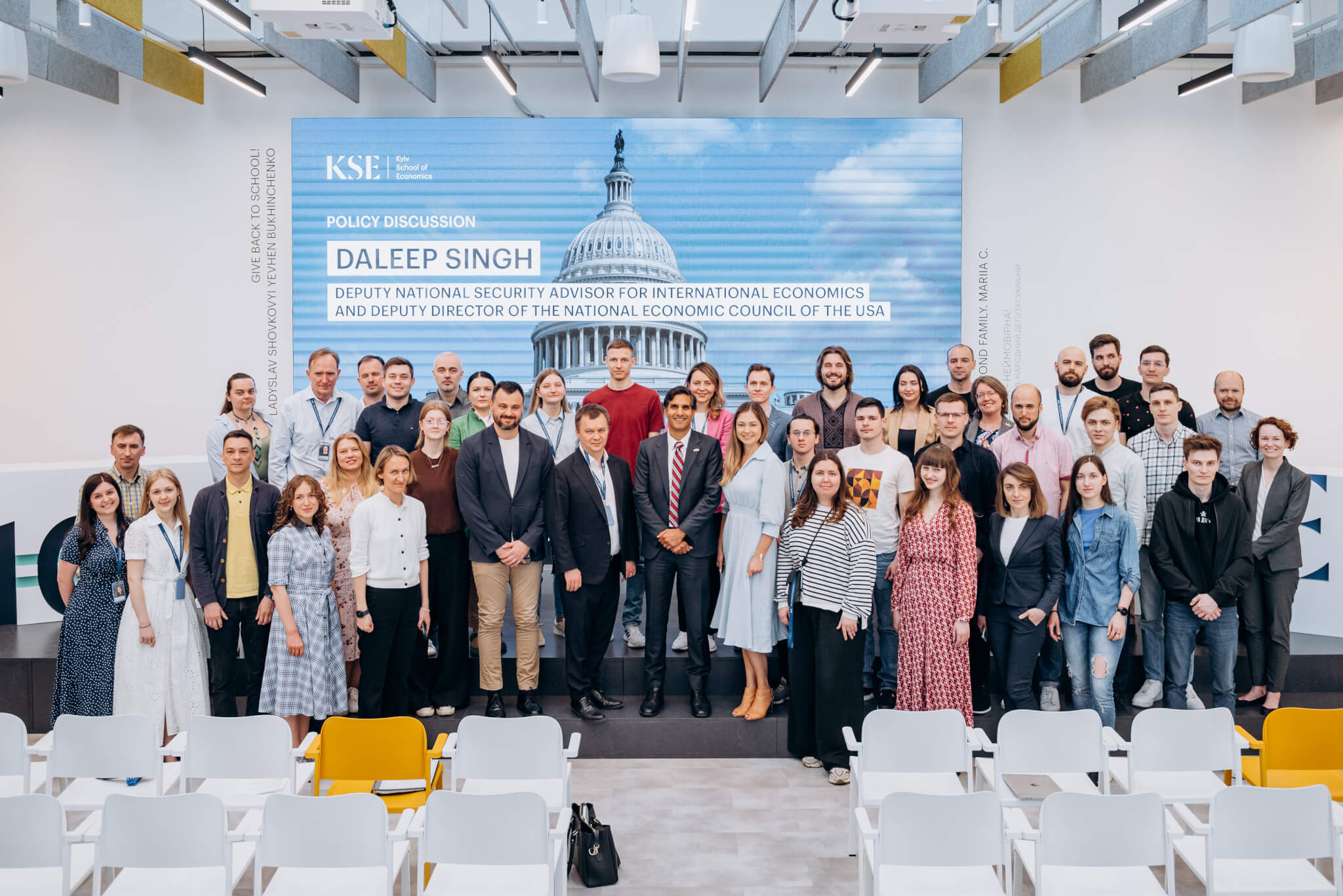- Kyiv School of Economics
- About the School
- News
- Kyiv School of Economics hosted a meeting with Daleep Singh, Deputy National Security Advisor
Kyiv School of Economics hosted a meeting with Daleep Singh, Deputy National Security Advisor
11 April 2024

On Wednesday, 10 April, Kyiv School of Economics hosted a meeting with Daleep Singh, United States Deputy National Security Advisor for International Economics. In this capacity, he coordinates the administration’s policymaking process for a range of issues at the intersection of economic policy and national security.
The meeting was moderated by Tymofiy Mylovanov, President of Kyiv School of Economics.
The meeting focused on the issues of financial assistance programs for Ukraine, the confiscation of frozen assets of the Central Bank of Russia abroad, and the steps that Ukraine and its allies should take to accelerate economic development.
Speaking about the economic assistance to Ukraine, Daleep Singh underlined the unity among the allies and the ongoing efforts of the US to expand the financing.
“Today, the Steering Committee of the Multi-Agency Donor Coordination Platform – the MDCP – met here in Kyiv to affirm that Ukraine’s many partners, including the United States, remain resolute in our commitment to support Ukraine’s wartime needs, recovery and reconstruction.
Of course, I need to acknowledge here that desperately needed U.S. funding is still pending with our Congress. President Biden is continuing to engage with Congressional leaders, we are working our hardest to pass that funding, and we are optimistic that the House of Representatives will act soon,” Daleep Singh said in his speech.
The Deputy National Security Adviser also underlined the prospects for the recovery and development of Ukraine’s economy on the path to self-sufficiency.
“In that spirit, I want to give special thanks to our hosts at the Kyiv School of Economics – a longstanding partner of the United States, a truth-teller that is holding Russia to account for the destruction it has wreaked, and an analytical anchor for the recovery path that lies ahead”, Daleep Singh said.
During the meeting, Daleep Singh emphasized 4 steps, which allow for future planning and contribute to accelerated economic development.
• The first step is to unlock the value of Russian sovereign assets frozen within our jurisdictions for the benefit of Ukraine.
Daleep Singh noted that “International law is clear on this point. Russia must pay for the damage it has caused in Ukraine. And it is not for Russia to decide if or when that happens. Every G7 leader has agreed that Russian sovereign assets in our jurisdictions will remain immobilized until Russia pays for the damage its war has caused. We welcome the EU’s recent decision to ensure that revenues from Russia’s immobilized sovereign assets are used for Ukraine’s benefit. We are working closely with our G7 partners to explore how we can maximize the impact of these revenues – both current and future – for the benefit of Ukraine today, not only for the direct financial benefit it would provide, but also for the signal it will send to Putin: we will not fatigue, and you will not outlast us”.
• Second, Ukraine needs public and private creditors to work together to agree on debt restructuring. The first crucial test is to successfully restructure private debt this summer. The second step will be to restructure public debt by the end of the IMF program in 2027.
• Third, Ukraine and its partners need to work creatively with the private sector to incentivize private sector investment – especially in Ukraine’s real economy.
• Fourth, the government and people of Ukraine, with the support of international partners, must press ahead with reforms that create the conditions for sustained capital inflows and maximize the returns on the investments we are making together.
“Despite this reckless war and senseless destruction, Ukraine’s economy grew by 5 percent last year. Macroeconomic conditions are stable. Inflation is under control. Ukraine’s foreign reserves are at an all-time high. And Ukrainian bonds are rebounding because investors are willing to bet on its future.
That’s where Putin miscalculated. While Russia’s trendlines are decidedly downward – with its economy caught in a negative feedback loop of less talent, less capital, less technology, and less integration – Ukraine’s economy is on the cusp of realizing a positive dynamic of greater investment, higher productivity, more integration, and the full backing of the free world,” Daleep Singh said.
